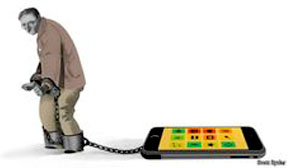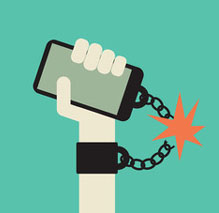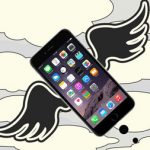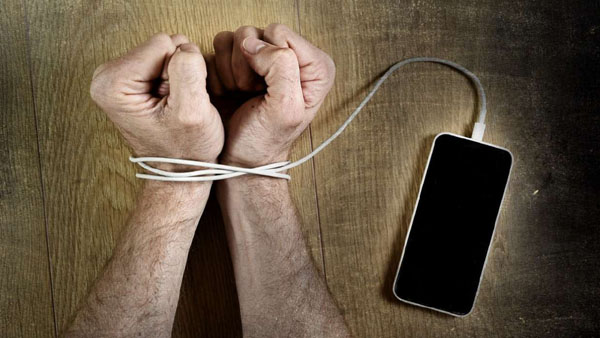Flying Anchors: Balanced Connectivity
“Chains of habit are too light to be felt until they are too heavy to be broken.”
– Warren Buffett, Investor
Many of us will be reading this article on a smartphone or tablet rather than on a desktop PC. The days of being tied down by Ethernet cables are behind us. We are always connected since “mobile technologies like smartphones and tablets have removed the geographic boundaries and…the appeal of social media is tremendous—it triggers our fundamental drive for social connection and allows us more control over our world” (Rutledge, 2013). But there comes a point when that connectivity can become a new anchor chaining us down.
 Experts have observed that our use of mobile media can become a habit and “when you allow bad habits to take over, they dramatically impede your path to success,” according Dr. Travis Bradberry (2017). He warns that “the challenge is bad habits are insidious, creeping up on you slowly until you don’t even notice the damage they’re causing” especially when confronting how our growing connection can unbalances our lives.
Experts have observed that our use of mobile media can become a habit and “when you allow bad habits to take over, they dramatically impede your path to success,” according Dr. Travis Bradberry (2017). He warns that “the challenge is bad habits are insidious, creeping up on you slowly until you don’t even notice the damage they’re causing” especially when confronting how our growing connection can unbalances our lives.
Dr. Pamela B. Rutledge, Director of the Media Psychology Research Center, takes a firm stance toward respectfully embracing the wealth of benefits of the connected age from an empowered perspective. “At the end of the day,” she said, “our smartphones, laptops and tablets are just tools. As with all powerful tools, we have to learn how to use them well” or they will use us (2013).
Noticing Our Chains
“Social networks do best when they tap into one of the seven deadly sins. Facebook is ego. Zynga is sloth. LinkedIn is greed.”
– Reid Hoffman, Entrepreneur
 When looking at our lives, it can be hard to see the chains because they are crafted of convenience and pleasure. What begins as searching Google to answer a question, checking Facebook or playing a mobile game becomes a dragging anchor as we are habituated to “impulsively surfing” as soon as our attention wanders, Dr. Bradberry said. Attention will wonder when “it takes you 15 consecutive minutes of focus before you can fully engage in a task. Once you do, you fall into a euphoric state of increased productivity called flow. Research shows that people in a flow state are five times more productive than they otherwise would be” (2017). We trade productive euphoria for a cheap fix and most of all we forget that we “are the boss of our technology, not the other way around,” (Rutledge, 2013).
When looking at our lives, it can be hard to see the chains because they are crafted of convenience and pleasure. What begins as searching Google to answer a question, checking Facebook or playing a mobile game becomes a dragging anchor as we are habituated to “impulsively surfing” as soon as our attention wanders, Dr. Bradberry said. Attention will wonder when “it takes you 15 consecutive minutes of focus before you can fully engage in a task. Once you do, you fall into a euphoric state of increased productivity called flow. Research shows that people in a flow state are five times more productive than they otherwise would be” (2017). We trade productive euphoria for a cheap fix and most of all we forget that we “are the boss of our technology, not the other way around,” (Rutledge, 2013).
The convenience of “getting notified every time a message drops onto your phone or an e-mail arrives in your inbox might feel productive but isn’t.” It disrupts our flow, requires us to refocus, and ultimately creates a Pavlovian response in our reflex and pleasure centers because of the implied social attention of every ping. “Instead of working at the whim of your notifications, pool all your e-mails/texts and check them at designated times” like once an hour.
We drag our chains to the bedroom if “using your phone, tablet, or computer in bed. Most of our favorite  evening devices—laptops, tablets, and mobile phones—emit short-wavelength blue light brightly and right in your face. This exposure impairs melatonin production and interferes with your ability to fall asleep as well as with the quality of your sleep once you do nod off” (Bradbury, 2017). There is no greater wellness drag than sleep loss. A better alternative is to make a rule to keep the mobile devices out of the bedroom.
evening devices—laptops, tablets, and mobile phones—emit short-wavelength blue light brightly and right in your face. This exposure impairs melatonin production and interferes with your ability to fall asleep as well as with the quality of your sleep once you do nod off” (Bradbury, 2017). There is no greater wellness drag than sleep loss. A better alternative is to make a rule to keep the mobile devices out of the bedroom.
The final piece is to examine not just what were chained to, and how often, but the weight on the other side. Dr. Rutledge and Dr. Bradbury recommend being mindful of our social media connections themselves and what they bring to, or pull from, our lives.
There is the burden from outside like “thinking about toxic people” or even toxic news feeds or recent political events which “have a way of getting under your skin and staying there.” While some advocate blocking or unfriending, Dr. Bradbury suggests that when you encounter a post, “a person who makes your blood boil,” or are thinking about one, “practice being grateful for someone” or something else in your life instead (2017).
There is also the burden from within. “When your sense of pleasure and satisfaction are derived from comparing yourself to others, you are no longer the master of your own happiness,” but it is common for us to have stabs of inferiority when looking at the successes of others, especially if our lives aren’t post-worthy at the moment (Bradbury, 2017). In those moments it’s best to return to gratitude for our friends’ joys, and also to keep into perspective that everyone is having hard times, just not posting it. Dr. Rutledge says to “Don’t use others’ behavior to determine yours” or your self-worth. “Take the time to identify your larger goals” and if you find yourself falling short “evaluate your social media use and determine if it’s helping you meet those goals” (2013).
From Anchors to Balloons
“Going to bed at night saying we’ve done something wonderful, that’s what matters to me.”
– Steve Jobs, iGuy
 We need not be in chains to the anchors of our smartphones because our tools need not be anchors. They were designed to make life more fun, convenient and connected. They are to lighten our load. “If you feel harassed and overwhelmed by information overload or pressure from all that connectivity…keep a social media diary for a few days to learn what you use, when you use it and how it makes you feel” and then start unchaining or turning anchors to balloons (Rutledge, 2013).
We need not be in chains to the anchors of our smartphones because our tools need not be anchors. They were designed to make life more fun, convenient and connected. They are to lighten our load. “If you feel harassed and overwhelmed by information overload or pressure from all that connectivity…keep a social media diary for a few days to learn what you use, when you use it and how it makes you feel” and then start unchaining or turning anchors to balloons (Rutledge, 2013).
There are many strategies listed throughout that can help us find the balance and stay connected to that which improves our lives, but it all comes back to empowering ourselves. Perhaps we begin with a weekend technology break, just to remember the feeling of being unplugged. If we like it, then we slowly reintegrate only that which lifts us up.
“It takes a while for everyone to figure out new environments, learn new behaviors and to understand the interpersonal and professional implications of social media,” Dr. Rutledge encourages (2013). “However it’s only by using the tools that we will gain the skills we need to successfully navigate a digital world.”
Our digital world is our present and our future. It is our choice if we let it drag us down or if we use it to soar.
____________________________________________________
Bradberry, T. (2017) Ten Bad Habits You Must Eliminate from Your Daily Routine. Huffington Post. Retrieved from: http://www.huffingtonpost.com/dr-travis-bradberry/10-bad-habits-you-must-el_b_14577098.html
Rutledge, P. (2013) The Healthy Use of Social Media. Psychology Today. Retrieved from: https://www.psychologytoday.com/blog/positively-media/201310/the-healthy-use-social-media


